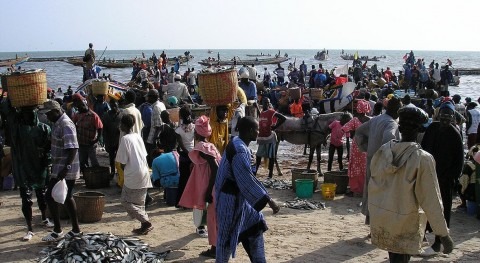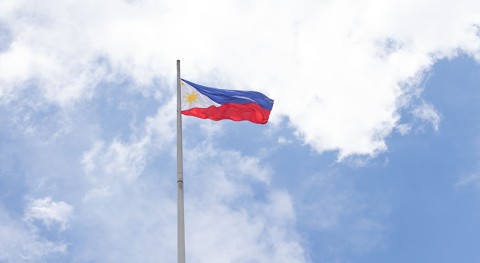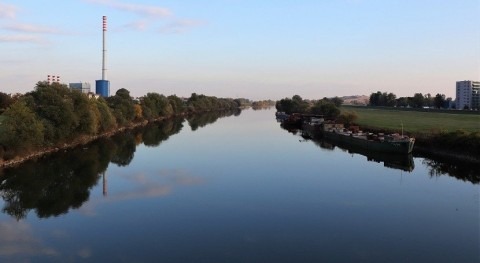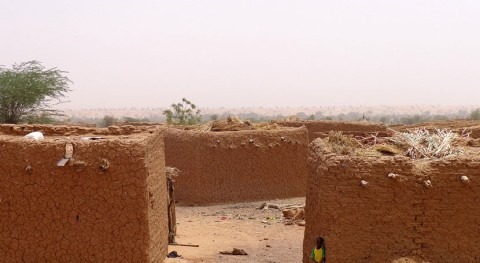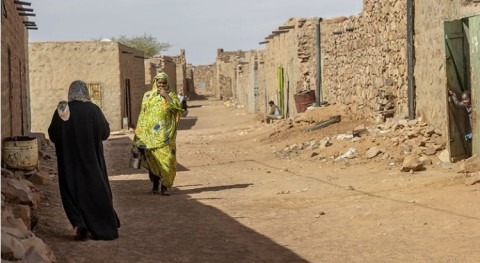Working closely with worldwide partners, the World Bank aims to achieve “A Water-Secure World for All” by sustaining water resources, building resilience and delivering services.
In the near future, water or lack thereof could become one of the greatest risks to economic progress, poverty eradication and sustainable development. The consequences of this will be felt disproportionately by the poorest and most vulnerable. Therefore, it is essential to invest in clean water and sanitation; something the World Bank is an expert in as the world’s largest multilateral source of financing for water in developing countries. We recently had the pleasure of speaking with Gustavo Saltiel, Lead Water and Sanitation Specialist at The World Bank, to learn about this international financial institution and discover the impact the current pandemic has had on the world’s WASH sector.
Question: Could you tell us briefly about your career path and your current role in The World Bank Group?
Answer: Currently, I am the Global Lead for Water Supply and Sanitation of the Water Global Practice at the World Bank. As such, I coordinate global knowledge activities and operational support to World Bank teams across different regions. I joined the World Bank in 2003 as Senior Water Engineer in the Latin America Region, and later was appointed as Sector Leader for Sustainable Development in Mexico, Program Manager of International Waters in the Africa Region, and Lead Water Supply and Sanitation Specialist in Peru, to coordinate lending operations and analytical work in the southern cone of Latin America. Before joining the World Bank, I held senior level positions in Argentina, including as General Manager of Aguas Bonaerenses, the Water Utility in the Province of Buenos Aires, Head of Planning and Regulatory Affairs of the private concessionaire Azurix, and Manager at the Buenos Aires Water and Sewerage Services Regulatory Agency (ETOSS), among others.

Q: A year since the COVID-19 pandemic hit, how do you think it has impacted the water and sanitation sector?
A: Whilst access to water supply and sanitation (WSS) services is at the core of sustainable development, quality of life and public health, including for prevention and mitigation of pandemics, such as COVID-19, today globally 785 million people do not have access to an improved water source, 2.5 billion people lack access to improved sanitation and 80% of wastewater globally is released to the environment without adequate treatment.
The COVID-19 pandemic has placed additional challenges on water service provision across developing countries. The increasing pressure on water service providers stems from lower revenues, increased costs, debt service obligations and the need to ramp up service delivery, particularly in low-income communities.
Lessons learned from other crises suggest that these can offer important opportunities for advancing crucial WSS reforms and water investments
In many instances, utilities are scrambling to mobilize emergency sources of water (e.g., drilling new boreholes in The Gambia) or are deploying water tankers to serve areas that are unconnected to the water network or receive intermittent water supply (e.g., in Ghana). While these measures can provide some respite to communities in need of water, they highlight the social and economic vulnerabilities of countries that do not have adequate WSS service coverage for all their citizens.
The suspension of water billing (for all or part of the population) has been a common feature of countries’ socio-economic response to the crisis. However, the costs of such suspension could have lasting impacts on the financial and operational sustainability and the governance of water utilities and other service providers in the sector. Water utilities are also facing challenges in covering labour costs, providing adequate protective equipment (PPE) to their staff, and addressing supply chains disruptions (such as chlorine for water treatment in southern Africa). Moreover, there is a risk that utilities may defer needed investments in new production, expansion of services, asset renewal and other capital expenditures faced with shrinking balance sheets and a shift in priorities in favour of short-term emergency response.
As shown by a survey of U.S utilities conducted by the American Water Works Association (AWWA), over half of the systems surveyed anticipate that workforce absenteeism will impact operations within the next months. In addition, nearly 64% of respondents indicated that they expect revenue/cash flow challenges within the next 2 months. While there is less available data from developing countries, there is anecdotal evidence about the challenges confronting service providers and the responses they are already putting in place.
Lessons learned from previous crises, or “catalytic events”, suggest that they can offer important opportunities for advancing crucial WSS reforms and investment in the water sector. The COVID-19 pandemic is increasing awareness about the social and economic costs of under-investing in WSS, which could, in turn, catalyse efforts to achieve universal WSS in line with the SDGs.

Q: The World Bank Group is the largest single investor in water projects globally. How has it responded to the pandemic?
A: Consistent with the World Bank approach to responding to the challenges resulting from the COVID-19 pandemic and the need to build an inclusive and resilient recovery, the Water Global Practice of the World Bank is supporting WSS utilities and service providers to increase safe access to both services, ensuring the resilience of water systems and sustaining their water resources, thereby increasing water security.
The Water Global Practice of the World Bank is supporting WSS utilities and service providers to increase safe access to both services
As such, many recent World Bank Operations have included components that support improving WASH in health care facilities and schools, other programs have supported utilities with financial relief resulting from reductions in revenues and other projects are focusing on increasing access of the poor to water supply and sanitation services.
In this context, an emerging area of work is on the technological innovations that will spearhead the provision of water access points in slums and rural areas of developing countries, including through automated water kiosks that provide water dispensing services using cashless payment systems. We are exploring the possibility of scaling up these systems in our programs to provide safe WASH access to the unserved thereby increasing their protection against COVID-19 and other contamination sources.
Colombia - Rio Bogota Environmental Recuperation and Flood Control Project. With Cooporacion Autonoma Regional de Cundinamarca (Colombia)
Q: Why is strengthening the governance and performance of utilities a critical element of post-COVID-19 rebuilding?
A: In the past, Governments and Donors have tackled water sector reforms as a series of high-profile changes to sector policies and infrastructure often through individual, not well coordinated interventions. Some projects were used to jump-start the sector - by raising tariffs prematurely or building large-scale infrastructure – and were done without first making the necessary adjustments to the foundational issues of utility performance and sector governance. For example, expanding water supply systems without improving performance only puts a greater risk on the long-term sustainability of a utility’s operations by increasing both costs and inefficiencies. Using this approach, significant resources invested in the water sector have failed to reap the expected outcomes.
Improving the efficiency of service providers will be of paramount importance in the post COVID world given the expected reductions in cost recovery, fiscal transfers and subsidies for utilities as a result of the crisis. As such, COVID-19 offers an opportunity to implement more comprehensive approaches to WSS sector improvements, where utilities should play a pivotal role. Many utilities are already well-established entities with legal mandates, expertise, capacity to undertake construction works, and the potential to attract commercial finance.
Many recent World Bank Operations have included components that support improving WASH in health care facilities and schools
Utilities can realize their full potential as professionalized organizations that meet the demands of their customers. Many utilities across high-income countries, as well as in lower- and middle-income countries such as SABESP in Sao Paulo, Brazil (a state-owned company), Cambodia (Phnom Penh Water Supply Authority, a municipal-owned company) and the Philippines (Manila Water, a private company), have become world-class service providers, in part because they operate under strong governance arrangements or can leverage commercial finance.
Successful and sustainable reform is not only possible, but within reach. From Australia to Benin, countries have transformed an inefficient urban water sector into a commercially viable sector with the autonomy and independence to attract their own sources of financing. Individual utilities across Burkina Faso, Brazil, and Vietnam, have implemented turnaround programs by strengthening the broader enabling environment, allowing the government to redirect scarce public resources to other priorities for poverty reduction.
Expanding water supply systems without improving performance puts a greater risk on the long-term sustainability of a utility’s operations
The World Bank’s ‘Utilities of the Future’ (UoF) Initiative seeks to promote future-focused utilities which provide reliable, safe, inclusive, transparent, and responsive water supply and sanitation services to all through fit-for-purpose practices that allow it to operate in an efficient, resilient, and sustainable manner. As such, the UoF delivers solutions across the water cycle. Emerging technologies enable smarter management of the water resources and assist utilities with improving resilience and providing effective wastewater treatment. The shift from a linear to a circular approach that recognizes the energy and nutrient content of wastewater streams, allow wastewater treatment plants to become water resources and energy generators, and providers of nutrients for agriculture. Moreover, a responsive utility benefits from innovations such as the new digital technologies, advances in sensors, software, blockchain and artificial intelligence.
However, utilities do not function in a vacuum. They require for the right incentives to be embedded in the Policy, Institutional and Regulatory (PIR) environment. With those incentives in place, a utility can transition out of the status quo towards a more sustainable business model that enables independence, financial autonomy and access to commercial finance, and a greater capacity to provide sustainable universal access. Therefore, “Building Back Better” from COVID-19 also offers an opportunity to improve PIR systems in the countries to strengthen resilience and sustainability of infrastructure and systems.
.JPG)
Q: How can emerging technologies help the water sector deliver solutions across the water cycle?
A: To achieve SDG6 in the face of the growing water crisis, innovation and technology will have a vital role to play in scarcity and safety, water efficiency, utility operations, and data and analytics. Yet, the water sector has historically been conservative, slow to adopt and disseminate new technologies. This slow adoption of technology is the result of four main characteristics of the water sector and water business: (1) many countries are missing the policy vision and leadership required to provide the necessary incentives to advance innovative approaches; (2) water service providers are frequently resource-limited, lacking sufficient skilled staff and financing to invest in research, testing, and deploying new technologies and they are also constrained by low water prices; (3) limited policy, institutional and regulatory incentives to innovate; and (4) water utilities are geographically and functionally fragmented: innovation champions are needed to transition to a supportive culture that uses systems thinking to break down siloes and encourages successful uptake of new technologies or approaches.
The Utilities of the Future use innovative approaches to address current challenges and demands as well as support recovery from COVID-19, incorporating forward-looking principles of resilience, energy and water efficiency, inclusion, circular economy, innovation, and fit-for-purpose governance. They embrace emerging technologies that enable smarter management of the water resources and assist them with improving resilience and providing effective wastewater treatment. The utilities of the future also engage more fully with others that share the water resource through watershed-based approaches, innovative partnerships, and adaptive management techniques to ensure that their actions maximize environmental benefits.
An emerging area of work is on technological innovations that will spearhead the provision of water access points in slums and rural areas
Innovative utilities use natural assets such as ecosystems and water resources to improve water and sanitation services and build resilience to environmental challenges such as climate change. The emerging technologies in this area enable smarter management of the water resources, increasing the availability of freshwater and reducing treatment costs. Using data collected via a multitude of sources such as sensors, cameras, radars and satellites, utilities can identify sources of contamination of their water sources thereby allowing them to improve water quality before it is treated.
In light of the rapidly changing environment in which utilities operate, the World Bank has developed a framework to guide utilities in initiating and maintaining reform efforts with a goal of becoming a Utility of the Future. The UoF framework provides a step-by-step approach to initiating and maintaining reform efforts that set the utility on a path towards achieving this goal. Service to customers is the ultimate objective and depends on technical and commercial operations, but not exclusively so. Other elements of sound utility management are organization and strategy, human resource management (HRM), and financial management. Together, these promote effective and efficient commercial and technical operations — for instance, by increasing staff productivity and reducing water losses. The legal framework and governance in which the utility operates shapes its governing environment. The UoF is also characterized by innovation (introducing novel methods), inclusion (improving the ability, opportunity, and dignity of people, disadvantaged on the basis of their identity, to take part in society), market and customer orientation (operating as a firm in a competitive market), and resilience (having capacity to prepare for disruptions, to recover from shocks and stresses, and to adapt and grow from a disruptive experience).
The World Bank’s UoF Initiative seeks to promote future-focused utilities which provide safe water supply and sanitation services
Innovation in the clean water sector is already taking place because it’s good for the utility, the environment, the community, and the economy. There are many promising innovative technologies to help address the water crisis and contribute to achieving SDG6. In this section, we highlight technologies for (1) improved water management and securing a resilient water supply, (2) improved utility management, (3) improved customer service and relationships, and (4) reaching the unserved.
The Utility of the Future Framework developed by the World Bank provides a methodology for utilities to gradually improve the use of innovative solutions through climbing a ladder of maturity levels. This allows utilities to adopt their own appropriate technologies choosing a rate of improvement consistent based on resources available and the context in which they operate.
To enable utilities to leapfrog from basic to world-class maturity levels, incorporating customer responsive and resilient practices, regulation of water services must evolve to encourage technological innovations through concrete incentives embedded in the tariff determination processes. In the UK, the Regulator (Ofwat)’s price review framework promotes innovation by providing early tariff determinations and financial and reputational benefits for companies that develop and implement new ways of working including the use of new markets; cooperating more effectively with third parties; and moving from successful pilots to swiftly embed best practice from the water sector and other sectors into their day to day business.










